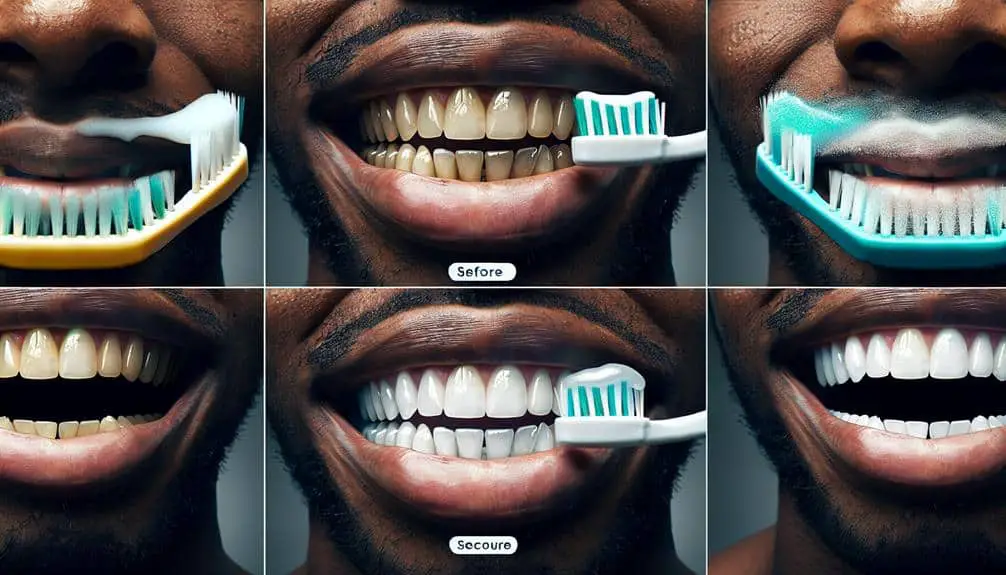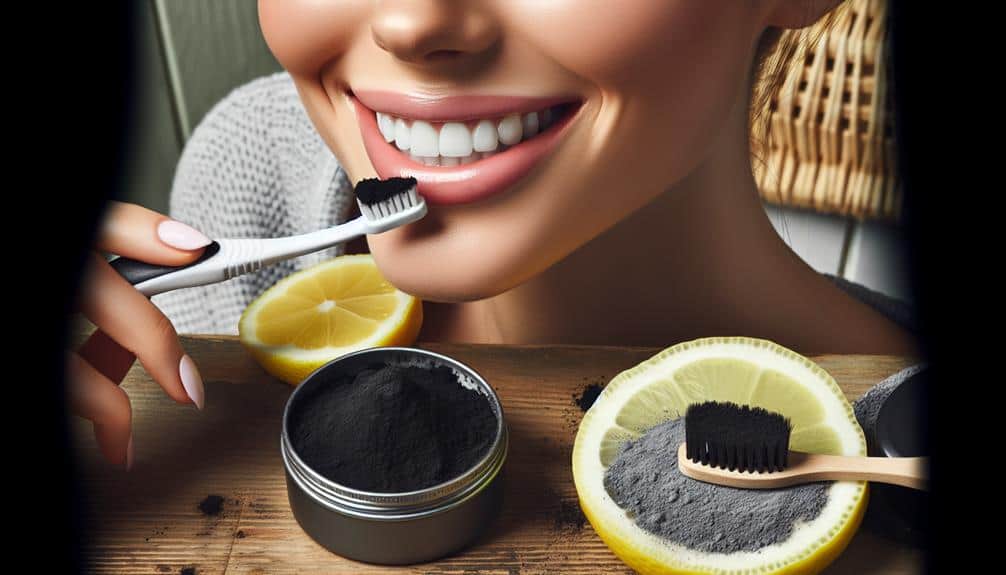Achieve a whiter smile by using hydrogen peroxide effectively. Mix it with baking soda to create a paste, which acts as a gentle abrasive while the peroxide serves as a bleaching agent. Brush your teeth for 1-2 minutes with this mixture, seeking dental advice if needed. Incorporate this into your routine weekly, but limit usage to once a week, diluting the peroxide properly and using a soft-bristled toothbrush as instructed to prevent adverse effects. Consistent oral hygiene, avoiding staining foods and drinks, and regular dental check-ups will help maintain your pearly whites.
Key Points
- Use low (around 3%) concentration to avoid enamel damage.
- Consult with a dentist before starting treatment.
- Mix with baking soda to create a whitening paste.
- Limit applications to once a week for best results.
- Maintain oral hygiene and avoid staining foods for lasting effects.
Benefits of Hydrogen Peroxide Teeth Whitening
When used properly, hydrogen peroxide teeth whitening can effectively remove stains and discoloration from your teeth. The health benefits of this method include improved oral hygiene and reduced risk of gum disease. Hydrogen peroxide has antibacterial properties that can help kill harmful bacteria in your mouth, promoting healthier gums and teeth. Additionally, by removing stains, hydrogen peroxide can give you a brighter and more confident smile, boosting your self-esteem and overall well-being.
In terms of long-term effects, consistent use of hydrogen peroxide teeth whitening can lead to sustained whiter teeth over time. By incorporating this method into your oral care routine, you can maintain a bright smile for an extended period. However, it's essential to follow recommended guidelines and not overuse hydrogen peroxide, as excessive use can lead to tooth sensitivity and damage to the enamel. Remember, moderation is key to reaping the long-term benefits of hydrogen peroxide teeth whitening.
Safety Precautions for Hydrogen Peroxide Use
To guarantee safe and effective hydrogen peroxide use for teeth whitening, it's essential to follow specific safety precautions. Precautionary measures are vital to prevent any adverse effects and secure ideal results.
Initially, always use a low concentration of hydrogen peroxide specifically formulated for oral use, typically around 3%. Higher concentrations can lead to irritation and damage to the gums and teeth. Proper application is key – avoid swallowing the solution and rinse your mouth thoroughly after each use.
It's recommended to consult with a dentist before starting any hydrogen peroxide teeth whitening regimen, especially if you have sensitive teeth or existing dental issues. Additionally, limit the frequency of treatments to prevent enamel damage. If any irritation or discomfort occurs during or after whitening, discontinue use and seek professional advice.
DIY Hydrogen Peroxide Teeth Whitening Recipe
For those seeking to improve their smile using hydrogen peroxide, consider this easy DIY teeth whitening formula. One natural option is to mix hydrogen peroxide with baking soda to create a paste. Baking soda serves as a gentle abrasive that helps remove surface stains on teeth, while hydrogen peroxide acts as a bleaching agent to brighten teeth.
To make this blend, mix a small amount of hydrogen peroxide with baking soda to form a paste. Carefully brush your teeth with this mixture for approximately 1-2 minutes, then rinse thoroughly.
It's important to note that while this DIY formula can deliver immediate results, its long-term effects aren't yet fully understood. Excessive use of hydrogen peroxide can potentially cause tooth sensitivity or gum irritation. As such, it's advisable to use this homemade teeth whitening formula sparingly and seek advice from a dentist if you have any concerns.
Remember to uphold good oral hygiene practices in addition to natural alternatives for teeth whitening to maintain overall dental health.
How Often to Use Hydrogen Peroxide
Consider incorporating hydrogen peroxide into your teeth whitening routine on a weekly basis to achieve peak results without risking potential sensitivity or irritation. Maintaining a regular frequency of hydrogen peroxide application is vital for effective whitening while also ensuring the health of your teeth and gums.
When using hydrogen peroxide for teeth whitening, it's advisable to limit its application to once a week. This frequency provides ample time for your teeth to recover and minimizes the risk of sensitivity issues. Overusing hydrogen peroxide can lead to enamel damage and gum irritation, so it's important to adhere to this suggested timeline.
When it comes to application techniques, make sure to follow the instructions carefully. Properly diluting the hydrogen peroxide is crucial to prevent any adverse effects. Additionally, consider using a soft-bristled toothbrush for gentle application and brushing.
Tips for Maintaining Whitened Teeth
Maintaining the brightness of your teeth post-whitening requires consistent oral hygiene practices and avoidance of staining beverages and foods. To preserve your radiant smile, focus on diet maintenance by limiting consumption of dark-colored beverages like coffee, tea, and red wine, which can stain teeth over time.
Additionally, acidic foods such as citrus fruits and sugary snacks can erode enamel, making teeth more susceptible to discoloration. Brushing your teeth at least twice a day with a whitening toothpaste and flossing daily are essential practices to prevent the buildup of plaque and surface stains.
Consider using a whitening mouthwash to help maintain your results. Regular dental check-ups and professional cleanings can also aid in keeping your teeth white and healthy. Remember, good oral hygiene is key to preserving your whitened smile and ensuring long-lasting results.
Frequently Asked Questions
Can Hydrogen Peroxide Teeth Whitening Cause Sensitivity or Discomfort?
When using hydrogen peroxide for teeth whitening, sensitivity management is vital. To prevent discomfort, consider safety precautions like avoiding dental restorations. Prioritizing oral health and seeking professional guidance for a safe whitening experience are fundamental.
Is It Safe to Use Hydrogen Peroxide Teeth Whitening if I Have Dental Restorations Like Crowns or Veneers?
If you have dental restorations like crowns or veneers, using hydrogen peroxide teeth whitening may not be safe. Check with your dentist for compatibility. Consider alternative whitening methods to protect your dental work.
Are There Any Long-Term Effects of Using Hydrogen Peroxide for Teeth Whitening?
When considering long-term effectiveness, using hydrogen peroxide for teeth whitening may pose potential risks like enamel damage or gum irritation. Professional whitening alternatives offer safer options to maintain a bright smile without compromising oral health.
How Can I Prevent Hydrogen Peroxide Teeth Whitening From Causing Irritation to My Gums?
To prevent irritation and maintain gums health during hydrogen peroxide teeth whitening, employ proper application techniques. Use a custom tray to avoid contact with gums, follow recommended dilution ratios, and limit treatment frequency to protect your oral tissues.
Can Hydrogen Peroxide Teeth Whitening Be Used on Children or Teenagers?
When contemplating hydrogen peroxide teeth whitening for children or teenagers, it's important to be cautious. Age restrictions exist due to potential risks. Parental supervision is necessary. Consider alternative options or consult a dentist for safe whitening methods.



